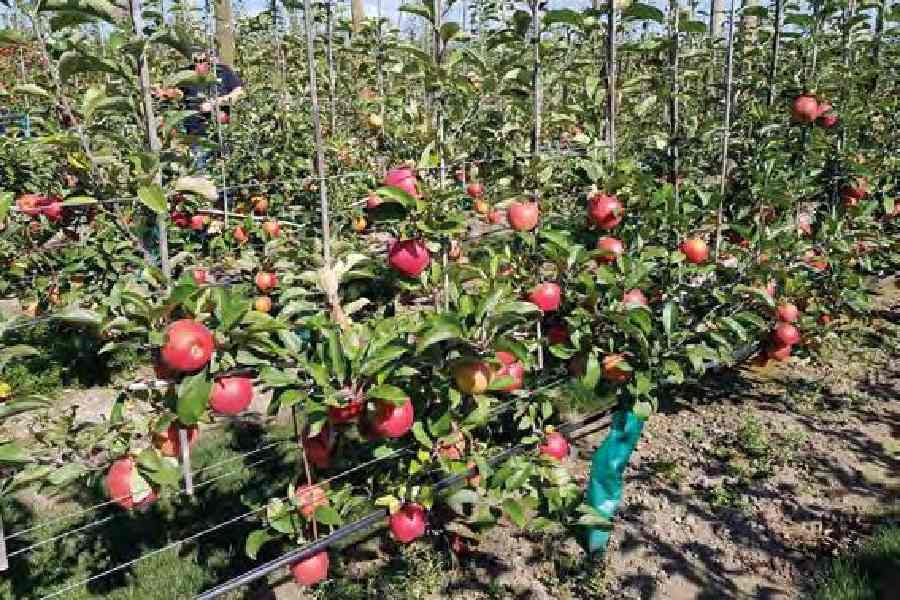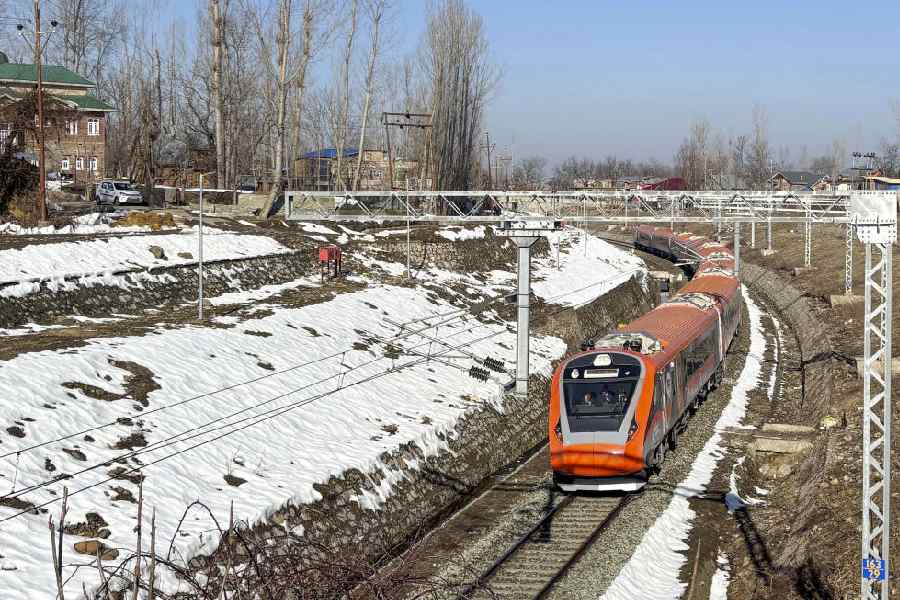The yield of major fruit crops like good quality apple, pear, peach, plum, and apricot has plummeted over the last seven years in Uttarakhand due to a warming climate, according to a study.
The decline in yield and area under cultivation of these major fruits has been stark during the period, says a study conducted by Climate Trends, an organisation doing research in the field of environment and climate change.
The dip is particularly remarkable for temperate fruits as compared to tropical, it said. Changing temperature patterns in the state could partially explain the shifting horticultural production. With a warming climate rendering certain fruit varieties less productive, farmers are shifting towards tropical alternatives which are better attuned to the altering climatic conditions, the study said.
Uttarakhand has witnessed a massive shrinkage in the area under horticulture production, which also coincides with the declining yields of major fruit crops in the state between 2016-17 and 2022-23, the study said.
Cultivated in the higher altitudes of the Himalayas, temperate fruits like pear, apricot, plum and walnut have seen the maximum fall in production.
The area under apple production reduced from 25,201.58 hectares in 2016-17 to 11,327.33 hectares in 2022-23 with a corresponding 30 per cent decline in yield, the study revealed.
The yield of lemon varieties shrunk by 58 per cent. In comparison, tropical fruits were less affected.
For example, despite nearly 49 and 42 per cent reduction in cultivation area, the production of mango and litchi remained relatively stable, with slight declines of 20 and 24 per cent, respectively.
The variations in fruit production area in Uttarakhand between 2016-17 and 2022-23 reveal striking shifts in cultivation patterns across different fruit types. The increase in production of guava and gooseberry indicates a shift in focus towards fruit types that are better attuned to market demand or local conditions.
Tehri registered the maximum decline in area under cultivation followed by Dehradun, according to the study. Almora, Pithoragarh and Haridwar on the other hand recorded notable reductions in both - areas under cultivation and fruit yields.
A warming climate can partly explain these profound changes in horticulture production in Uttarakhand.
The average temperature in Uttarakhand increased at an annual rate of 0.02 degree Celsius between 1970 and 2022. The state recorded approximately 1.5-degree Celsius warming over the same period with higher elevations experiencing amplified rates of warming, the study said.
Research reveals that relatively warmer winter temperatures in the higher altitudes have accelerated melting of snow triggering a rapid decline in snow-covered areas. In the past 20 years, winter temperatures at high altitudes of the state have increased at the rate of 0.12 degree Celsius per decade.
In Uttarkashi, Chamoli, Pithoragarh, and Rudraprayag districts, snow-covered areas have shrunk by nearly 90-100 km in 2020 as compared to 2000.
Winter chill and snow are the prerequisites for growth and flowering of fruits like apple, plum, peach, apricot, pear, and walnuts, grown in higher altitudes of the Himalayas.
Exceptionally warm winters, less snowfall, and shrinking snow-covered area may have caused abnormal pattern of bud-break and subsequently reduced flowering and yields of temperate fruits.
“Traditional temperate crops like high quality apples have a chilling requirement of less than seven degrees Celsius for 1200-1600 hours during the period of dormancy (December-March). Apples require two-three times more snowfall than what the region received in the last five-10 years leading to poor quality and yield,” explained Dr Pankaj Nautiyal, Head and Senior Scientist, Horticulture, ICAR-CSSRI at Krishi Vigyan Kendra.
“Baarish aur barf kam hone se bahut hi dikkat ho rahi hai (Lack of snow and rain is posing a major hurdle in fruit production),” mentioned Mohan Chaubatia, a farmer from Ranikhet.
He further said that the production of temperate fruits has reduced to half in the last two decades in Almora. Farmers who cannot afford irrigation have been the worst affected due to the increasingly dry winters and low fruit productivity in the state, he added.
A warming climate favours tropical fruit cultivation while warmer temperatures hinder the growth of winter fruits. So, farmers are gradually shifting to tropical alternatives.
In some districts of Uttarakhand, farmers are choosing low chilling cultivars of apples or replacing hard nut fruits like plum, peach, and apricots with tropical alternatives like kiwi and pomegranate.
In fact, there has also been an experimentation with high density cultivation of Amrapali variety of mango in the lower hills and valleys of Uttarkashi district, which generated high returns for farmers.
Suggesting the way forward, Dr Subash Nataraja, Head, Division of Agricultural Physics, ICAR-IARI, New Delhi, said the declining horticulture production in Uttarakhand paints a dull future of a once thriving industry.
“The short-term variability and trends in temperature are worrying, and there is a need to study the long-term trends in weather variables and its relation to yield, especially, its relation with any change in crop/cropping pattern or shift in crop/cropping pattern,"he said.
It is, therefore, necessary to shift towards climate resilient practices to safeguard the horticulture sector from future risks, he said.
Except for the headline, this story has not been edited by The Telegraph Online staff and has been published from a syndicated feed.










